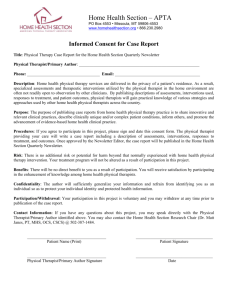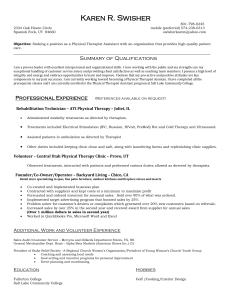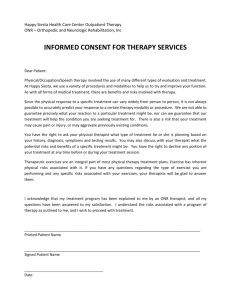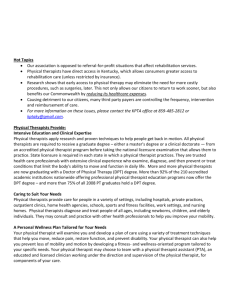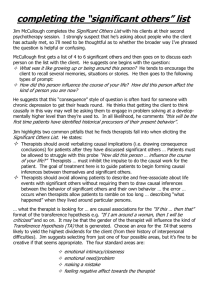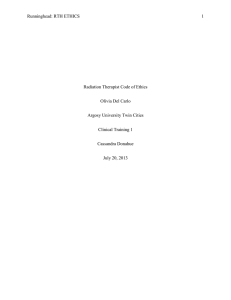ASRT Code of Ethics Paper
advertisement
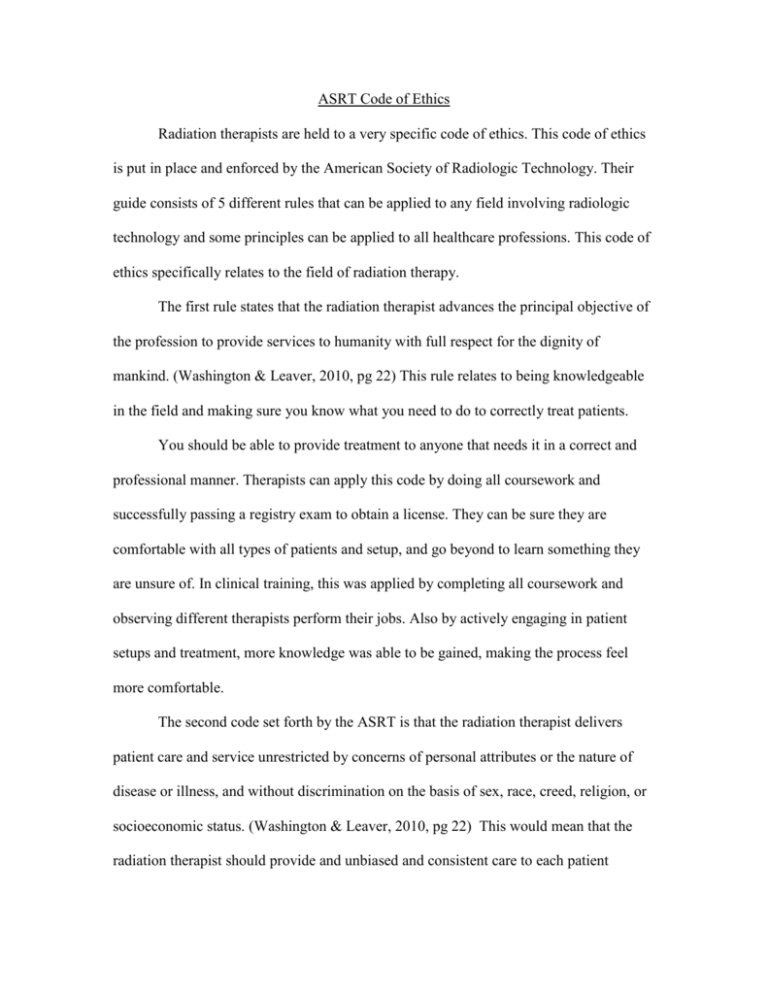
ASRT Code of Ethics Radiation therapists are held to a very specific code of ethics. This code of ethics is put in place and enforced by the American Society of Radiologic Technology. Their guide consists of 5 different rules that can be applied to any field involving radiologic technology and some principles can be applied to all healthcare professions. This code of ethics specifically relates to the field of radiation therapy. The first rule states that the radiation therapist advances the principal objective of the profession to provide services to humanity with full respect for the dignity of mankind. (Washington & Leaver, 2010, pg 22) This rule relates to being knowledgeable in the field and making sure you know what you need to do to correctly treat patients. You should be able to provide treatment to anyone that needs it in a correct and professional manner. Therapists can apply this code by doing all coursework and successfully passing a registry exam to obtain a license. They can be sure they are comfortable with all types of patients and setup, and go beyond to learn something they are unsure of. In clinical training, this was applied by completing all coursework and observing different therapists perform their jobs. Also by actively engaging in patient setups and treatment, more knowledge was able to be gained, making the process feel more comfortable. The second code set forth by the ASRT is that the radiation therapist delivers patient care and service unrestricted by concerns of personal attributes or the nature of disease or illness, and without discrimination on the basis of sex, race, creed, religion, or socioeconomic status. (Washington & Leaver, 2010, pg 22) This would mean that the radiation therapist should provide and unbiased and consistent care to each patient without discriminating against others. A therapist should also leave personal views and opinions out of treating patients, only giving them facts that they are certain of. Therapists can apply this code of ethics by treating all patients equally and not judging anyone. If someone needs special or extra attention, take the time to assist them. Treat patients as you would like to be treated if you were a patient. This is applied in clinical training by greeting every patient with a warm welcome and a smile. They treat everyone with the same respect and give attention to everyone. Different patients may need extra time to get on and off the table or extra time dressing, so we are patient with everyone and give them as much time as needed. The third rule states that the radiation therapist assesses situations, exercises care, discretion, and judgment; assumes responsibility for professional decisions and acts in best interest of patient. (Washington & Leaver, 2010, pg 22) This means that radiation therapists should act professional in all situations and use their best judgment. They should evaluate all situations and choose the best plan that would benefit the patient and give the best possible treatment. Therapists can apply this code by taking caution while setting patients up and treating them. They should double check everything they do and try to be as accurate as possible. In clinical training this is applied by always being cautious of the patient and double checking all setups. If I as the student were to set up a patient, a therapist would double check everything that I have done. Also any changes or questions that come up should be brought up and confirmed with the doctor. The fourth code states that the radiation therapist adheres to the tenets and domains of the scope of practice for radiation therapists. (Washington & Leaver, 2010, pg 22) This code means that therapists should do everything that their job entitles but only while staying in the scope of practice. They should be able to perform all aspects required of a radiation therapist but all should be within what the certification allows them to do. They should avoid things like offering patients diagnosis or progress reports. Therapists should treat and do everything that is required of them to successfully do their job to apply this code. They should avoid doing anything that is outside of their scope of practice, unless asked by a doctor who takes the responsibility. In clinical training, as a student you are not allowed to actually treat a patient. This can be applied by working with another therapist to do all of the setups and having them perform the actual treatment. Also having another therapist double check any moves you may decide need to be made and anything else that may be questioned. The fifth rule of the code of ethics states that the radiation therapist actively engages in lifelong learning to maintain, improve and enhance professional competence and knowledge. (Washington & Leaver, 2010, pg 22) This means that therapists should do things to further their education. .They should keep up with current methods and also stay current with new technology. Attending conferences and reading up on new material can be a good way to stay current in the field and keep track of up and coming technology. Therapists can follow this code by participating in continuing education such as conferences or the ASRT website to obtain CE credits and promote further learning. In clinical training this is applied by attending chart rounds/ tumor boards, attending any conferences that may come up, and also participating in any other continuing education that presents. If these codes are not being recognized, several consequences may be applied. Individuals professional license, permit, registration or certification can be denied, revoked or suspended and may be placed on probation, consent agreement or order, voluntarily surrendered subjected to any conditions or failing to report any of the violations or actions to the AART. Also you could receive a misdemeanor, felony or other fines.( American Society of Radiation Technologists) These codes are very important to anyone in the radiologic technology field and should always be followed. As a therapist, always try your best while staying within your scope of practice. Treat all patients with respect and always remain professional. Follow these codes and you will be a great therapist. References: American Society of Radiation Technologists. (n.d.). ASRT Code of Ethics. Retrieved June 3, 2013, from www.asrt.org/docs/practicestandards/codeofethics.pdf Washington, C. M., & Leaver, D. T. (2010). The Ethics and Legal Consideration of Radiation Therapy . Principles and practice of radiation therapy (3rd ed., pp. 22-28). St. Louis, Mo.: Mosby Elsevier.

